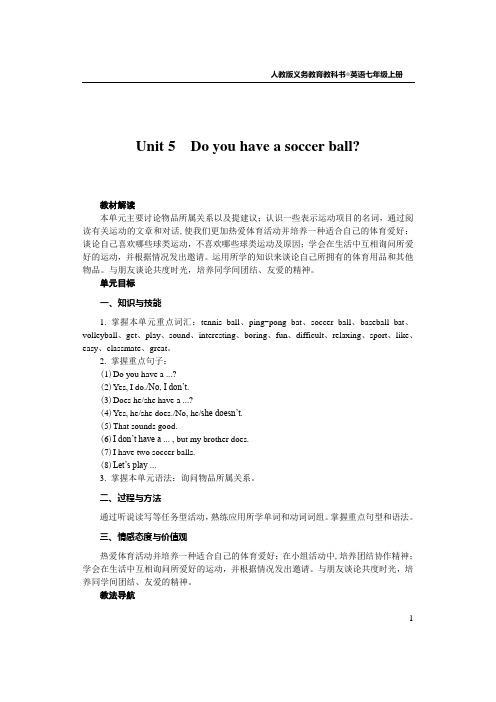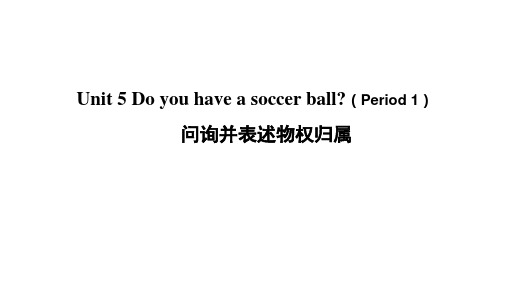七年级英语上学期unit5period1新目标
- 格式:ppt
- 大小:1.56 MB
- 文档页数:26


精品基础教育教学资料,请参考使用,祝你取得好成绩!unit 5 Do you have a soccer ball课题unit 5 Do you have a soccer ball 总课时,本单元第4 课时日期课型New 主备人复备人审核人学习目标 1 have a review of all the new words2 have a review of the grammar3 do more practice about the unit重点难点Words an d sent ences动词的第三人称单数形式教师活动学生活动时间复备标注教学过程 11 Check the homework.Recite 3ahave a dictation of the new w ords:interesting boring relax ing difficult fun easy intereste d 2重点句型:1 Do you have a TV? Yes , I do.2 Does he have a soccer ball ? Yes, he does. No, he doesn’t .3 Let`s play tennis. That sounds great.4 I don’t have a soccer ball.5 Tom have a great spor ts collection.6 He only watches them on TV.3Self check1 read the words and have a che ck of themselves.2 have a dictation of the words.3 make a new conversation4 read the conversation and try to act it out.教学过程巩固练习1 按要求写单词have –----三单,we ----宾格,lets ----全写形式do---三单, he---宾格,photo----复数形式watch ---三单,fun ---同义词2 翻译词组做运动,打篮球,体育俱乐部看电视,大量的体育收藏品,在电视上播放每天巩固练习教师点拨改错:1 That sounds well. Do you have a ball?2 Can you see she in the room?3 Great! Lets go and have look.4 There are a book and two pens here.5 Does your sister has a ping-pong bat?改句子。




人教版新目标七年级上unit5教案新目标英语教案设计Unit 5 三中:杨志远本单元教学目标:1.学会用have 对物品进行提问与问答。
2.学会用Let’s …提建议。
3.谈论自己喜爱的球类运动、不喜欢的球类运动及其原因。
4.谈论怎样和自己的朋友度过一段愉快的时光。
Teaching means: pictures or real objects found easily in schools, recorderI suggest we should finish teaching the unit in 5 periods: the first period, from 1a to 1c in Section A. The second period is from 2a to 2b .3a to activity 4 on page 27 is for the third .the fourth is from 1b to 2c in Section B and 3a to self check is for the last period.Now let’s talk about the teaching steps in details.First Period (1a-1c)Language goal: tennis racket, bat, soccer ball, Volleyball. Basketball ,television,badminton,ping- pong.Do you have a….?Step 1 review.Make conversations about “where-questions.” Such as “Where is the TV?It’s on the table ”after that ,we can ask “ Do you have a TV? Do you have a baseball? So on .in this way ,we can begin our new lesson like that.Step 2.In this period, ask balls as many as possible .such as :volleyball, badminton, pingpong, basketball ,football , soccer ball that students are interested in. Make sure some of studentsare good at playing balls and I am sure they can talk more than teachers .So ,ask them to tal k more ,Don’t care about they speak English or Chinese. It’s very important to make our class lively. At this moment, ask “ Do you have football ?” Help them answer “Yes, I do or No, I don’t” 在不知不觉中,通过问答。

七年级上册英语unit5
以下是七年级上册英语Unit5的相关信息:
单元主题:这个单元的主题是“学校生活”,主要围绕学生在学校的生活进行展开。
主要内容:
1. 词汇和表达:这个单元会学习一些与学校生活相关的词汇,如“图书馆”、“食堂”、“教室”等,以及一些表达方式,如“我通常在图书馆学习”、“放学后我喜欢打篮球”等。
2. 语法:这个单元会学习一些基本的英语语法,如现在进行时、一般现在时等。
3. 听力和口语:这个单元会通过听力材料和口语练习来提高学生的听力和口语能力,让学生能够听懂简单的英语对话,并且能够用英语进行简单的交流。
4. 阅读和写作:这个单元会通过阅读和写作练习来提高学生的阅读和写作能力,让学生能够读懂简单的英文短文,并且能够写一些简单的英文句子。
学习目标:
1. 让学生能够掌握与学校生活相关的词汇和表达方式。
2. 让学生能够掌握一些基本的英语语法。
3. 提高学生的听力和口语能力,让学生能够用英语进行简单的交流。
4. 提高学生的阅读和写作能力,让学生能够读懂简单的英文短文,并且能够写一些简单的英文句子。

Module 5My school dayUnit 1I love history.学习目标1. 学习并掌握本单元新单词:half, past, o’clock, to, art, geography, history,IT,maths,PE,lesson, then, like, difficult, love, subject, because, interesting, talk, begin, when。
2. 学习并掌握本单元重点句型:① We have art and history, but we don’t have maths. ② I love history and I’m good at it. ③ It’s my favourite subject because it’s very interesting.④ I can talk with my Chinese friends.3. 能够听懂时间的表达方式,能够正确进行时间的询问与表达。
4. 能够理解和朗读对话,谈论课程。
自主学习学习任务一:根据钟表所示时间,写一个句子学习任务二:预习活动3听录音,回答问题。
1. What is Betty’s favourite subject?2. What is Tony’s favourite subject?读对话,回答问题。
What lessons do they have on Monday?将课程与时间连线。
Lessons TimeA. IT E. 8: 00B. Chinese F. 8: 55C. maths G. 10: 20D. science H. The last lesson in the morning合作探究1. I love history and I’m good at it. 我喜欢历史课,而且我历史学得好。
be good at...意为“擅长……;在某方面做得好”,与do well in 同义。

新版目标英语七年级(上)Unit 5 单元教学设计一、教学内容及分析本单元主要学习动词Have 的一般现在时的用法,使用Do 和Does引导的一般疑问句的构成及简单回答。
本单元围绕和朋友一起欢度时光这一话题安排了三个任务。
(1)学生要学会就有关人与物之间所属关系进行问答的句子。
本单元大量引入有关运动的名词,要求学生彼此询问有无此类物品,并做出相应的回答. A: Do you have a basketball?B;Yes, I do./ No, I don’t.A; Does he / she have a tennis ball.B; Yes, he/ she does. No, he / she doesn’t.A; Do they have a volleyball?B; Yes, they do. / No, they don’t.(2)学习表示建议的句型let’s……并且进行有效的操练。
(3)学习使用形容词来描述体育活动,将形容词和体育活动的名词,以及相关动词结合起来。
二、学习者特征分析本单元的主题是使用have对物品所属进行提问及问答,以掌握行为动词在一般现在时的构成和使用,同时引导学生使用所学的句型谈论自己在球类运动中的喜好。
行为动词在一般现在时的肯定句、否定句和一般疑问句的构成和使用是初中英语教学中非常重要的内容,本单元的知识掌握程度将直接影响学生今后的英语学习。
因此教师在教学中一定要善于引导,以免学生养成不良习惯。
三、单元整体目标分析1、知识与能力:(1)词汇;tennis, ball, soccer, volleyball, basketball, TV, sport, class, classmate, us, we, them, fun, great, interesting, boring, late, difficult, relaxing, easy, same, do(does), let, go,have(has),get, play, sound, watch, love, like, only, with, after (2)语言知识:a:在询问对方是否有某物的对话中学会使用do和does引导的一般疑问句。

人教版义务教育教科书◎英语七年级上册Unit 5 Do you have a soccer ball?教材解读本单元主要讨论物品所属关系以及提建议;认识一些表示运动项目的名词,通过阅读有关运动的文章和对话,使我们更加热爱体育活动并培养一种适合自己的体育爱好;谈论自己喜欢哪些球类运动,不喜欢哪些球类运动及原因;学会在生活中互相询问所爱好的运动,并根据情况发出邀请。
运用所学的知识来谈论自己所拥有的体育用品和其他物品。
与朋友谈论共度时光,培养同学间团结、友爱的精神。
单元目标一、知识与技能1. 掌握本单元重点词汇:tennis ball、ping-pong bat、soccer ball、baseball bat、volleyball、get、play、sound、interesting、boring、fun、difficult、relaxing、sport、like、easy、classmate、great。
2. 掌握重点句子:(1)Do you have a ...?(2)Yes, I do./No, I don’t.(3)Does he/she have a ...?(4)Yes, he/she does./No, he/she doesn’t.(5)That sounds good.(6)I don’t have a ... , but my brother does.(7)I have two soccer balls.(8)Let’s play ...3. 掌握本单元语法:询问物品所属关系。
二、过程与方法通过听说读写等任务型活动,熟练应用所学单词和动词词组。
掌握重点句型和语法。
三、情感态度与价值观热爱体育活动并培养一种适合自己的体育爱好;在小组活动中,培养团结协作精神;学会在生活中互相询问所爱好的运动,并根据情况发出邀请。
与朋友谈论共度时光,培养同学间团结、友爱的精神。
教法导航11. 利用图片和实物调动学生的兴趣和积极性。



新版新目标七年级上册英语Unit5学案Unit 5 Do you have a soccer ball? (Section A1a --1c)第一课时【学习目标】【自学合作探究】1.根据音标熟练读、写本课单词网球_______________ 球____________ 乒乓球_____________ (英式)足球_____________排球___________________ 篮球____________________ 球棒,球拍____________用于构成否定句和疑问句;做,干_____________ 有____ __2.预习SectionA1a-1c,翻译下列句子。
a.你有乒乓球拍吗?是的,我有。
________________________________________________________________ _________________. b.你有乒乓球吗?不,我没有。
________________________________________________________________ _________________. 3.认真观察1a的图片,将单词与图中的人物搭配,小组讨论并核对答案。
【师生互动】1. 教师利用图片与全班学生实行句型操练,再实行小组抢答。
T:Do you have a soccer ball?Ss:No, I don’t.T: Do you have a ping-pong ball?Ss: Yes, I do.2. 以小组为单位练习对话句型,然后小组派代表向其他小组提问:Do you have a …? 其他小组利用老师发放的图片来回答。
3. 听力练习 1b .(1)学生听录音,完成1b。
(2)老师学生一起核对答案。
(3)老师向学生展示听力材料,学生听录音跟读。
【课堂练习】(一)根据句意及汉语提示写词。
1. I _____________ (有) a nice bag.2. ___________________(乒乓球)is my favorite(最喜欢的)。

Unit 5 Do you have a soccer ball?Section A period 1(By Michelle)单项选择()1. ---Do you play tennis? ----- .A. Yes, I doB.Yes, I amC. No, I doesn’tD. No, I am not ( ) 2. --- your father have a car? ----Yes, he .A. Is, isB. Does , haveC. Does, doesD. Do, have( ) 3. --- you a baseball? -----Yes, I .A. Do, have, doB. Do, has, don’tC. Does, have, don’tD. Does, have, do( ) 4. My sister have a tennis, she a tennis racket.A. don’t, hasB. don’t, haveC. doesn’t, haveD. doesn’t, has ( ) 5. Does Jim’s uncle a computer?A. hasB. haveC. beD. does句型转换1.You have a tennis racket.(改为一般疑问句并作肯定回答)2.He has a computer.(改为一般疑问句并作否定回答)3.She has an alarm clock.(改为否定句)4.You have a base ball bat. (改为否定句)5.She is in the room. (改为一般疑问句并作肯定与否定回答)根据句意及首字母填词1. ----Do you h a tennis racket?----Yes, I do.2. Frank is l for school today.3. Let’s p basketball after school.4. The idea s good.5. Internet bars shouldn’t l people under 18 in.用所给词的适当形式填空1. My sister (have) a soccer ball.2. He (not have) a watch.3. Let’s (play) soccer.。

Unit 5 Do you have a soccer ball?Period 1 Section A 1a—2c【课型】听说课学习目标1.能掌握本课重点词汇:do,have,ball,tennis,soccer,volleyball,basketball2.能初步口头运用Do you have...?Does he/she have...?等句型询问物品的所属关系,并能作出相应回答。
3.能基本听懂含有本课重点词汇和目标语言的听力材料。
4.能通过谈论体育运动,增加同学间的了解和对体育运动的热爱。
学习过程【自主学习】1.请在课前会拼读下面的单词,并熟记。
do,have,ball,tennis,soccer,volleyball,basketball2.你熟悉以下球类的英文名字吗?参照课本单词表,写一写吧!【师生互动】[新知呈现]1.Play a game:guess “What is it?”2.观看幻灯片,说出自己熟悉的球类的英文称谓。
3.Pair work:两人一组,用幻灯片呈现有关球的图片,互问对方:—Do you have a/an...?—Yes,I do./No,I don’t.[新知学习]Listen to 2a.● While listeningPaulAlanMikeJaneDale2.Pair work:两人一组就上面的表格进行问答,以便巩固have的第三人称单数形式。
—Does Paul have a soccer ball?—No,he doesn’t.3.Listen carefully and fill in the blanks.Conversation 1A:Do you have a soccer ball,Paul?B: , .A: your brother Alan have one?B:Yes,he does.Conversation 2A:Hi,Mike.B:Hi,John.A:I want to play basketball. you have a basketball?B:Yes, .A:Great!观察与思考当我们询问对方是否拥有某物时,应这样询问:?可以用Yes, .和No, .进行回答。
